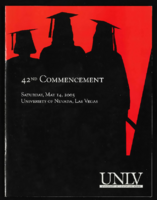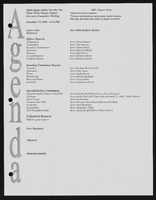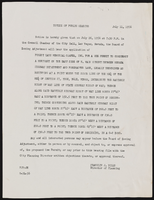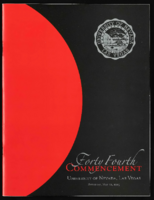Search the Special Collections and Archives Portal
Search Results

Transcript of interview with Rosemary A. Vassiliadis by Stefani Evans and Claytee White, April 12, 2017
Date
Archival Collection
Description
“My very first car… Oh, boy, I can't remember the year. It was old. But it was a [Chevrolet] Monte Carlo. Oh, my gosh, I was so excited. . . . It was my pride and joy. I'm a teenager, right? It was freedom. That's what it was.” It might seem incongruous that the aviation director for the nation’s eighth busiest airport ranked by passenger volume would begin an oral history rhapsodizing over the freedom her first car represented. But despite the powerful role she occupies professionally, Rosemary Vassiliadis remains true to her Chicago upbringing in a tight-knit Italian family, in which she was the first female on both sides to go to a four-year college. Rosemary attended nearby DePaul University, where she earned her degree in accountancy. Shortly before she graduated she was a bridesmaid for an Italian friend whose Greek Orthodox groom had asked Billy Vassiliadis to be his groomsman. Over the three days of the wedding Rosemary and Billy became acquainted and began a long-distance courtship that continued for nearly nine years before Rosemary finally agreed to marry Billy and make Las Vegas her home. This oral history chronicles Rosemary Vassiliadis’s Las Vegas career from financial analyst with the City of Las Vegas under Myron Leavitt to working with Randy Walker at Clark County to working with him again as deputy director of aviation at McCarran Airport; she shares how both men mentored her, and how their teaching has in turn inspired her to mentor younger women leaders. She talks about managing the airport in the six days after the Nine-Eleven (9/11) Terrorist Attacks, during which time Walker, who had been attending a conference in Montreal, was grounded there when all North American airports closed; she talks about working cooperatively with the Las Vegas Convention and Visitors Authority to transport tourists once the other airports opened, and she confides her determination to get her New York passengers home first so they could learn the fates of, comfort, and draw comfort from their loved ones. She walks listeners through the process of planning for Terminal 3, including financing it during the downturn, selecting its art, and seizing the opportunity to thank President Obama in person for making Terminal 3 possible-a “thank you” that resulted in an autographed photograph of the aviation director with the President as they stood on the tarmac in front of said terminal. While Rosemary’s ideas of freedom and transportation have likely matured since she bought her first gas guzzler in Chicago, she has acquired a firm grasp on what it takes to run the eighth-largest passenger airport in the U.S., which in 2017 serves the second-most popular U.S. travel destination (after New York City, according to TripAdvisor). Las Vegas is lucky that Rosemary agreed to serve as her friend’s bridesmaid and to eventually say “yes” to the persistent (and patient) Billy Vassiliadis. In 2017, Clark County School District recognized the couple’s many contributions by establishing the Billy & Rosemary Vassiliadis Elementary School.
Text

Transcript of interview with Marc Ratner by Barbara Tabach, August 23, 2016
Date
Archival Collection
Description
Marc Ratner moved to Las Vegas when he was in the seventh grade in 1957. His father became owner of a retail beauty supply business. It also was about the time Marc became a bar mitzvah. The Ratner family belonged to Temple Beth Sholom, as did everyone at the time, and a favorite memory he recalls is of sneaking a glimpse of crooner Eddie Fisher and actress Elizabeth Taylor getting married there. While growing up, Marc showed no particular interest in being a star athlete. He played little baseball and participated in track as a long jumper. Nevertheless, on the day of this oral history interview, Marc is sitting in his office surrounded by sports memorabilia. It is all a testimony, a museum highlighting his decades of officiating and regulating sports events. His stories include newsworthy boxing episodes that ranged from the infamous ?Fan Man? parachutist incident in 1963 during the Evander Holyfield vs Riddick Bowe fight at Caesars and the 1997 ?Bite Fight? when Mike Tyson took a bite out of Evander Holyfield?s ear. v In 2016, Marc was inducted into the International Boxing Hall of Fame, an extraordinary honor for a nonparticipant. He has long been a fan of the sport and talks about the first fight he ever attended, becoming a ring inspector in 1985 and then starting a new phase of his career in 2006, as Vice President of Regulatory Affairs for the Ultimate Fighting Championship [UFC]. In addition, Marc has dedicated much his life blowing the whistle at high school and college sports: he?s officiated on the football field for several conferences, bowl games and mentors would-be officials. He served as Nevada State Athletic Commission executive director for two decades. Among his community involvement is serving on the board of Jewish Family Services Agency. In 1997 he was honored by the National Council of Christians and Jews. Marc Ratner moved to Las Vegas when he was in the seventh grade in 1957. His father became owner of a retail beauty supply business. It also was about the time Marc became a bar mitzvah. The Ratner family belonged to Temple Beth Sholom, as did everyone at the time, and a favorite memory he recalls is of sneaking a glimpse of crooner Eddie Fisher and actress Elizabeth Taylor getting married there. While growing up, Marc showed no particular interest in being a star athlete. He played little baseball and participated in track as a long jumper. Nevertheless, on the day of this oral history interview, Marc is sitting in his office surrounded by sports memorabilia. It is all a testimony, a museum highlighting his decades of officiating and regulating sports events. His stories include newsworthy boxing episodes that ranged from the infamous ?Fan Man? parachutist incident in 1963 during the Evander Holyfield vs Riddick Bowe fight at Caesars and the 1997 ?Bite Fight? when Mike Tyson took a bite out of Evander Holyfield?s ear. v In 2016, Marc was inducted into the International Boxing Hall of Fame, an extraordinary honor for a nonparticipant. He has long been a fan of the sport and talks about the first fight he ever attended, becoming a ring inspector in 1985 and then starting a new phase of his career in 2006, as Vice President of Regulatory Affairs for the Ultimate Fighting Championship [UFC]. In addition, Marc has dedicated much his life blowing the whistle at high school and college sports: he?s officiated on the football field for several conferences, bowl games and mentors would-be officials. He served as Nevada State Athletic Commission executive director for two decades. Among his community involvement is serving on the board of Jewish Family Services Agency. In 1997 he was honored by the National Council of Christians and Jews. Marc Ratner moved to Las Vegas when he was in the seventh grade in 1957. His father became owner of a retail beauty supply business. It also was about the time Marc became a bar mitzvah. The Ratner family belonged to Temple Beth Sholom, as did everyone at the time, and a favorite memory he recalls is of sneaking a glimpse of crooner Eddie Fisher and actress Elizabeth Taylor getting married there. While growing up, Marc showed no particular interest in being a star athlete. He played little baseball and participated in track as a long jumper. Nevertheless, on the day of this oral history interview, Marc is sitting in his office surrounded by sports memorabilia. It is all a testimony, a museum highlighting his decades of officiating and regulating sports events. His stories include newsworthy boxing episodes that ranged from the infamous ?Fan Man? parachutist incident in 1963 during the Evander Holyfield vs Riddick Bowe fight at Caesars and the 1997 ?Bite Fight? when Mike Tyson took a bite out of Evander Holyfield?s ear. v In 2016, Marc was inducted into the International Boxing Hall of Fame, an extraordinary honor for a nonparticipant. He has long been a fan of the sport and talks about the first fight he ever attended, becoming a ring inspector in 1985 and then starting a new phase of his career in 2006, as Vice President of Regulatory Affairs for the Ultimate Fighting Championship [UFC]. In addition, Marc has dedicated much his life blowing the whistle at high school and college sports: he?s officiated on the football field for several conferences, bowl games and mentors would-be officials. He served as Nevada State Athletic Commission executive director for two decades. Among his community involvement is serving on the board of Jewish Family Services Agency. In 1997 he was honored by the National Council of Christians and Jews.
Text

University of Nevada, Las Vegas (UNLV) 42nd commencement program
Date
Archival Collection
Description
Commencement program from University of Nevada, Las Vegas Commencement Programs and Graduation Lists (UA-00115).
Text

Transcript of interview with Ronald Simone by Claytee White, May 5, 2009
Date
Archival Collection
Description
Musician Ronald Simone of Las Vegas credits his father’s guidance and his upbringing in New Haven, Connecticut, for shaping his musical and educational aspirations. Due to its proximity to New York City and the influence of Yale University, New Haven offered its residents the finest in musical entertainment; as a result, many musical greats were from or had lived in New Haven and most Broadway shows opened at New Haven’s Shubert Theater. Born in 1935 with the gift of perfect pitch, Simone began to play the piano at a young age and could play most pieces by ear. He began playing professionally at age eight in 1943 with a weekly stint on a radio show, Kitty's Revue. Still in grade school during World War II he began touring locally with an amateur producer, who formed a show that played military bases and hospitals around Connecticut and into New York and Massachusetts. In high school Simone formed his own trio and a quartet and played piano in gin mills, illegal card rooms, and resorts in upstate New York while playing trumpet in the high school band. He joined the Musicians Union at 18 and continued to play in New York and Connecticut clubs and theaters throughout his five years at Yale. During his second year at Yale the School of Music became a graduate school, from which Ron graduated in 1958. Ron’s sister Louise married one of his Yale classmates, a drummer, and the couple moved to Las Vegas. Ron visited his sister in 1959, loved the musical opportunities he saw, transferred his Musicians Union membership, and moved to Las Vegas with his friend, violinist Joe Mack, in September 1960. After sub work and playing a lounge show at the Riviera, he spent five and a half years in the Riviera showroom, moving in 1966 to the Desert Inn, where he played piano in the exclusive Monte Carlo Room for five years for the likes of Dean Martin, Sandy Koufax, Sammy Davis Jr., and Kirk Kerkorian. From there Simone went to the Dunes, where he remained for the next nineteen years working with choreographer Ronnie Lewis and rehearsing and playing all the Casino de Paris shows, line numbers, and production numbers. In July 1989, Musicians Local 369 went on strike. Because Simone was playing the Follies Bergere at the Tropicana—the first house band to strike—he was among the first musicians to walk out. Musicians at all but three Strip hotels (Circus Circus, Riviera, and the Stardust) followed. While the musicians strike lasted nearly eight months, Simone was recruited for sanctioned sub work for the duration at the Lido de Paris show at the Stardust. After the strike ended he worked with Johnny Haig's relief band playing six nights a week at various hotels.
Text

Stephen Round oral history interview: transcript
Date
Archival Collection
Description
Oral history interview with Stephen Round conducted by Claytee D. White on October 25, 2017 for the Remembering 1 October Oral History Project. In this interview, Stephen A. Round, a career military contractor, describes his experiences during the 2017 mass shooting in Las Vegas, Nevada. Round mentions moving to Las Vegas in 2013 and in later years staying at the Aria on the evening of October 1. He describes the chaos of the shooting and the 12-hour-plus lockdown at the Aria hotel and casino. The day after the shooting, Round built a memorial around the shooting site and protected it. Once the memorabilia of that first site was taken to the Clark County Museum, he moved to protect the second memorial at the "Welcome to Las Vegas" sign where crosses devoted to the victims had been placed. Along with his preservation of the memorials, Round describes his preparation of a book that was signed by many who visited the sites. Round explains that he was able to see some of the best and worst of humanity during those days of watching and caring for the memorial sites as well as helping any victims, families of the victims, and sympathizers of the Las Vegas 2017 shooting.
Text

David Becker oral history interview: transcript
Date
Archival Collection
Description
Oral history interview with David Becker conducted by Claytee D. White and Barbara Tabach on May 15, 2018 for the Remembering 1 October Oral History Project. In this interview, Becker recalls being on a three-day assignment at the Route 91 Harvest Country Music Festival across from the Mandalay Bay Resort in Las Vegas, Nevada. Thinking the gunfire was produced by malfunctioning equipment, he took photos of the scattering crowd. Moments later, in a now silent venue, he realized he captured a horrific massacre. Becker recalls photographing people leaving the venue as they performed acts of heroism, helping the fallen or the slow to reach safety. He discusses how difficult it is to comprehend the acts of that night, and how his photojournalist instincts allowed him to capture such devastating images.
Text

Alpha Kappa Alpha Sorority, Theta Theta Omega Chapter executive committee agendas
Date
Archival Collection
Description
From the Alpha Kappa Alpha Sorority, Incorporated, Theta Theta Omega Chapter Records (MS-01014) -- Chapter records file.
Text

City of Las Vegas building codes, notices, correspondence
Date
Archival Collection
Description
City of Las Vegas building codes, notices, correspondence
Text

University of Nevada, Las Vegas (UNLV) 44th commencement program
Date
Archival Collection
Description
Commencement program from University of Nevada, Las Vegas Commencement Programs and Graduation Lists (UA-00115).
Text
